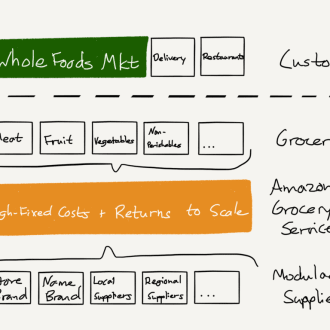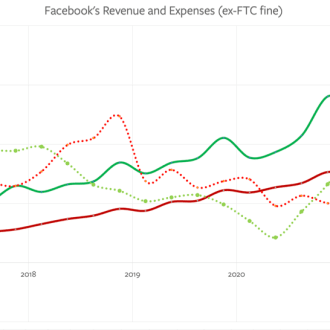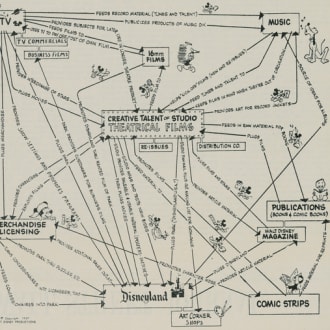The Best of Stratechery
20+ most popular Stratechery articles, as voted by our community.
Stratechery on Amazon
Amazon’s New Customer
The key to understanding Amazon’s purchase of Whole Foods is to understand that Amazon didn’t buy a retailer: the company bought a customer.
Alexa: Amazon’s Operating System
Money is made at chokepoints, and the most valuable chokepoints are operating systems; Amazon has built exactly that with Alexa.
Stratechery on Artificial Intelligence
The Arrival of Artificial Intelligence
What is artificial intelligence? Is it really any different than technology? In my estimation machine learning is truly something new, and the effects on society will be significant.
AI and the Big Five
Given the success of existing companies with new epochs, the most obvious place to start when thinking about the impact of AI is with the big five: Apple, Amazon, Facebook, Google, and Microsoft.
«This seems very well suited to AI: yes, generation may have marginal costs, but those marginal costs are drastically lower than a human»
Stratechery on Business
The Relentless Jeff Bezos
Jeff Bezos is retiring, and will go down as one of the great CEO’s in tech history, in part because of how he transformed Amazon into a tech company in every respect.
Meta Myths
Meta deserves a bit of a discount off of its recent highs, but a number of myths about its business have caused the market to over-react.
Stratechery on Business Models
The Idea Adoption Curve
Mapping the technology adoption curve to ideas gives insights as to which business models work on which parts of the addressable market.
Dollar Shave Club and The Disruption of Everything
Dollar Shave Club is a textbook example of how the new Internet economy will destroy value in incumbent industries.
Stratechery on Facebook
Manifestos and Monopolies
Facebook has long had too much power, but Mark Zuckerberg’s expressed willingness to use said power for political ends means it’s time to consider countermeasures.
Meta
Facebook’s reorganization into Meta is the ultimate bet on the power of founder control.
«Meta’s vision, to be clear, is that one ought to be able to access the metaverse from anywhere, including your phone, computer, AR glasses, and of course a VR headset.»
Stratechery on Google
Google I/O and the Coming AI Battles
Google A/I suggests that AI is a sustaining innovation for all of Big Tech; that means the real battle will be between incumbents and Big Tech on one side, and open source on the other.
Gemini and Google’s Culture
The Google Gemini fiasco shows that the biggest challenge for Google in AI is not business model but rather company culture; change is needed from the top down.
Stratechery on Podcasting
The Future of Podcasting – Stratechery by Ben Thompson
Podcasting is stuck between the open model of the past and the push for monetization in the future. Might there be a third way that actually benefits publishers?
Spotify’s Podcast Aggregation Play
Spotify is making a major move into podcasts, where it appears to have clear designs to be the sort of Aggregator is cannot be when it comes to music.
Stratechery on Technology
Zero Trust Information
Zero Trust Networking is security with Internet assumptions; there is tremendous value if we apply the same approach to information.
The WeWork IPO
The WeWork IPO is defined by audaciousness and excess, all of which is driven by unlimited access to capital.
Stratechery on TV
Disney’s Taylor Swift Era
Not even Taylor Swift can fight the devaluation of recorded music, but she makes it up in physical experiences; Disney isn’t much different, but it looks much worse given the company’s …
An Interview with Netflix co-CEO Greg Peters About Strategy and Execution
An interview with Netflix co-CEO Greg Peters about owning the customer relationship, Netflix culture and execution, advertising, games, and content strategy.
Stratechery on Twitter
Back to the Future of Twitter
Twitter should go private and return to its pre-2012 approach of being a centralized service with third-party clients.
Unmasking Twitter
Twitter has a new policy to listen to experts about what content to limit; what happens, though, when experts are wrong?
Popular
These are some all-time favorites with Refind users.
Clubhouse’s Inevitability
Clubhouse will do for audio what Twitter, Instagram Stories, and TikTok did for text, images, and video.
«Electrification of personal vehicles would have happened at some point; it seems fair to argue that Musk accelerated the timeline significantly.»
The Great Bifurcation
Tracing the evolution of tech’s three eras, and why the fourth era — the Metaverse — is defined by its bifurcation with the physical world.
«How much better if every account were based on a digital identifier unique to me and owned by no one, and now you understand the case for crypto wallets.»
The AI Unbundling
AI is starting to unbundle the final part of the idea propagation value chain: idea creation and substantiation. The impacts will be far-reaching.
The Great Unbundling
It’s trivial to say that the Internet changed media; what is more interesting is unpacking how different types of media were affected, and why — and what might happen to TV.
What is Refind?
Every day Refind picks the most relevant links from around the web for you. is one of more than 10k sources we monitor.
How does Refind curate?
It’s a mix of human and algorithmic curation, following a number of steps:
- We monitor 10k+ sources and 1k+ thought leaders on hundreds of topics—publications, blogs, news sites, newsletters, Substack, Medium, Twitter, etc.
- In addition, our users save links from around the web using our Save buttons and our extensions.
- Our algorithm processes 100k+ new links every day and uses external signals to find the most relevant ones, focusing on timeless pieces.
- Our community of active users gets the most relevant links every day, tailored to their interests. They provide feedback via implicit and explicit signals: open, read, listen, share, mark as read, read later, «More/less like this», etc.
- Our algorithm uses these internal signals to refine the selection.
- In addition, we have expert curators who manually curate niche topics.
The result: lists of the best and most useful articles on hundreds of topics.
How does Refind detect «timeless» pieces?
We focus on pieces with long shelf-lives—not news. We determine «timelessness» via a number of metrics, for example, the consumption pattern of links over time.
How many sources does Refind monitor?
We monitor 10k+ content sources on hundreds of topics—publications, blogs, news sites, newsletters, Substack, Medium, Twitter, etc.
Can I submit a link?
Indirectly, by using Refind and saving links from outside (e.g., via our extensions).
How can I report a problem?
When you’re logged-in, you can flag any link via the «More» (...) menu. You can also report problems via email to hello@refind.com
Who uses Refind?
450k+ smart people start their day with Refind. To learn something new. To get inspired. To move forward. Our apps have a 4.9/5 rating.
Is Refind free?
Yes, it’s free!
How can I sign up?
Head over to our homepage and sign up by email or with your Twitter or Google account.





















